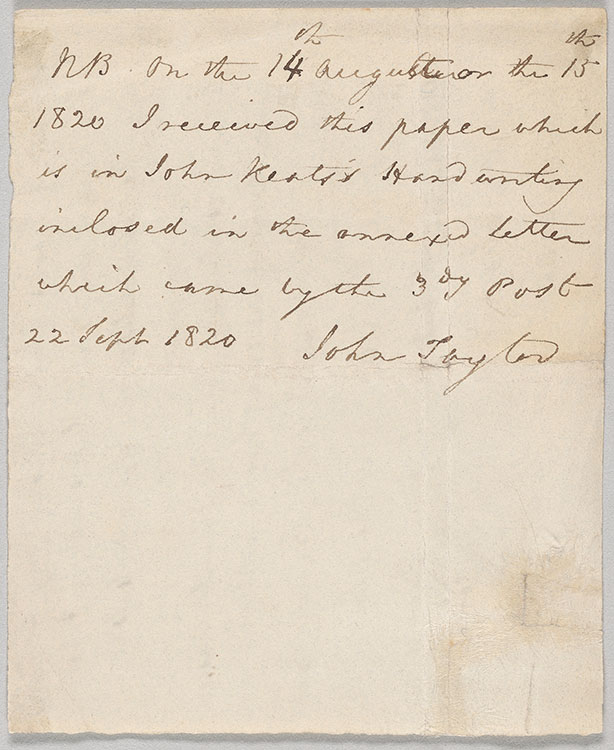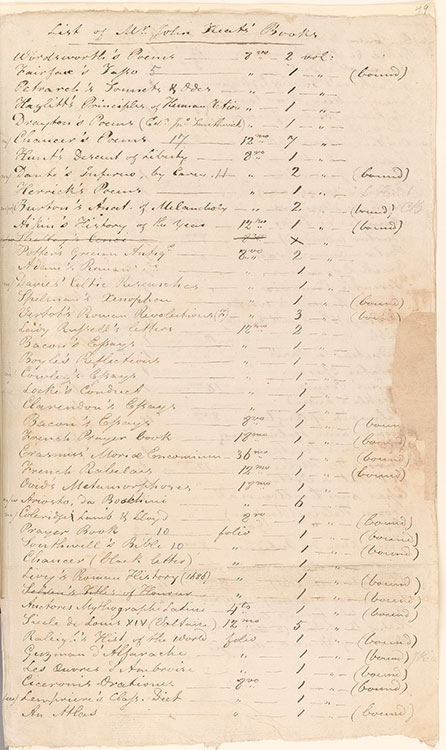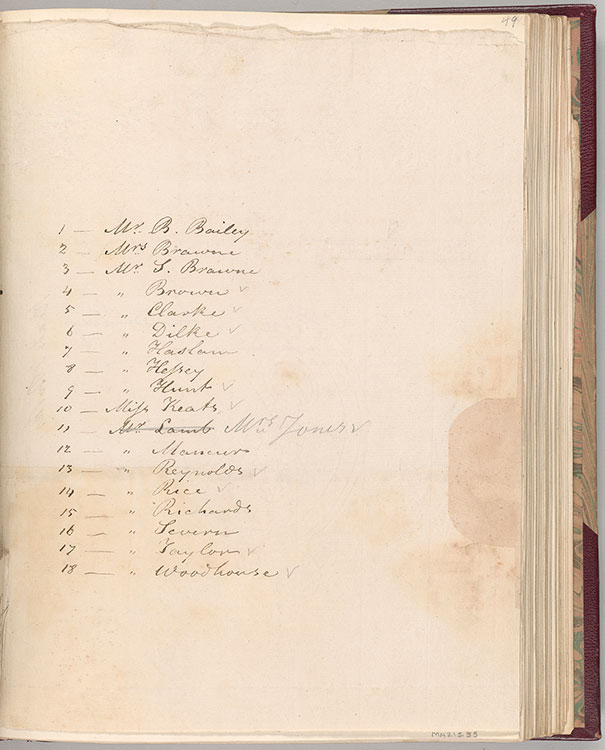"My chest of books divide among my friends"

Before leaving for Italy in 1820, Keats made arrangements “in case of [his] death” and sent this unofficial will to his publisher John Taylor:
My Chest of Books divide among my friends.
In case of my death this scrap of Paper
may be servicable [sic] in your possession.
All my estate real and personal consists
in the hopes of the sale of books publish’d or
unpublish’d. Now I wish Brown and
you to be the first paid Creditors—the
rest is in nubilus—but in case it
should shower pay my Taylor the
few pounds I owe him.
Though owed an inheritance unfairly withheld for years, at the end of his life Keats was afflicted by poverty, with only a small library and “the hopes of the sale of books” to his name. Written in iambic pentameter, “My chest of books divide among my friends” would prove to be his last line of verse.
To help execute the will’s terms, his former roommate and sometime traveling companion Charles Armitage Brown drafted a catalogue of Keats’s library and the names of friends who had lent or given books to the poet. The list includes volumes of Keats’s favorite writers—Dante, Spenser, and Shakespeare—along with literary works by Wordsworth, Tasso, Petrarch, Chaucer, Bacon, Erasmus, Rabelais, and Ben Jonson, as well as standard classical texts like Horace and Terence along with outliers such as “Fencing Familiarized.” (Keats, however, was known for his pugnacity as a young man and enjoyed boxing.) His multi-volume sets of Shakespeare and Spenser—missing their sixth and final five volumes, respectively—are preserved at the Houghton Library of Harvard University.
The list is bound within a volume of letters, transcriptions, and documents compiled by Richard Woodhouse (1788–1834), a lawyer who worked with Keats’s publisher John Taylor and helped edit his poems for print. Woodhouse was also the first Keats collector, not only gathering letters and documents written by friends of the poet but also assembling literary manuscripts and transcribing his poems, in some cases from now-lost original sources. The Woodhouse collection at the Morgan includes copies of several well-known Keats poems, including “Day is gone, and all its sweets are gone” and “Isabella: or, the Pot of Basil,” which is transcribed in shorthand.
John Keats's will, recto

John Keats, unofficial will, autograph manuscript, 1820, recto. MA 214.2. Purchased by J. Pierpont Morgan, 1909.
My Chest of Books divide among my friends.
In case of my death this scrap of Paper
may be servicable [sic] in your possession.
All my estate real and personal consists
in the hopes of the sale of books publish’d or
unpublish’d. Now I wish Brown and
you to be the first paid Creditors—the
rest is in nubilus—but in case it
should shower pay my Taylor the
few pounds I owe him.
John Keats's will, verso

John Keats, unofficial will, autograph manuscript, 1820, verso (in the hand of John Taylor). MA 214.2. Purchased by J. Pierpont Morgan, 1909
[in the hand of John Taylor]
NB On the 14th of August or the 15th
1820 I received this paper which
is in John Keats’s Handwriting
inclosed in the annexed letter
which came by the 3dy Post
22 Sept 1820 John Taylor
List of John Keats's books, p.1

Charles Armitage Brown, “List of Mr. John Keats’ Books,” autograph manuscript, July 1821, p. 1. MA 215.55. Purchased by J. Pierpont Morgan, 1906.
p. 1
List of Mr John Keats’ [sic] Books1
Wordsworth’s Poems
Fairfax’s Tasso
Petrarch’s Sonnets & Odes
Hazlitt’s Principles of Human Action
Drayton’s Poems (Ed[itio]n Jo[h]n Smethwick)
Chaucer’s Poems
Hunt’s Descent of Liberty
Dante’s Inferno, by Carey
Herrick’s Poems
Burton’s Anat[omy] of Melancholy
Aikin’s History of the Year
Shelley’s Cenci
Potter’s Grecian Antiq[uitie]s
Adam’s Roman [Antiquities]
Davies’ Celtic Researches
Spelman’s Xenophon
Vertot’s Roman Revolutions (F[rench])
Lady Russell’s letters
Bacon’s Essays
Boyle’s Reflections
Cowley’s Essays
Locke’s Conduct
Clarendon’s Essays
Bacon’s Essays
French Prayer book
Erasmus’ Moriae Encomium [Praise of Folly]
French Rabelais
Ovid’s Metamorphoses
Ariosto, da Boschini
Coleridge Lamb & Lloyd
Prayer Book
Southwell’s Bible
Chaucer (black letter)
Livy’s Roman History (1686)
Selden’s Titles of Honour
Auctores Mythographi Latini [Latin Mythographic Authors]
Siecle de Louis XIV (Voltaire) [Century of Louis XIV]
Raleigh’s Hist[ory] of the World
Guzman d’Alfarache
Les Ouvres d’Ambroise [Works of Ambrose]
Ciceronis Orationes [Orations of Cicero]
Lempriere’s Class[ical] Dict[ionary]
An Atlas
1. This transcription includes the titles of books, with editorial expansions and title translations indicated by brackets. The transcription does not include information about format or the number of volumes, nor does it reproduce the “m” and “w” letters added by Brown to certain entries.
List of John Keats's books, p.2

Charles Armitage Brown, “List of Mr. John Keats’ Books,” autograph manuscript, July 1821, p. 2. MA 215.55. Purchased by J. Pierpont Morgan, 1906
p. 2
Ben Jonson & Beaumont & Fletcher
Rime di Petrarca [Petrarch’s Verses]
Ainsworth’s Dict[ionary]
Z. Jackson’s Illus[tration]s of Shakespear[e]
Carew, Suckling, Prior, Congreve, Blackmore, Fenton, Granville, and Yalden
Ovidii Metamorphoseon [Ovid’s Metamorphoses]
Bailey’s Dictionary
Hunt’s Juvenilia
Fencing familiarized
Dudley’s Memoirs
Aminta di Tasso [Tasso’s Aminta]
Burton (abridged)
Poetae minores Graeci [Minor Greek Poets]
Greek Grammar
Terentii Comoediae [Terence’s Comedies]
Bishop Beveridge’s Works
Old Plays (5th vol. with Reynolds)
Bible
Conducteur à Paris [Driver in Paris]
Horatii Opera [Horace’s Works]
Burns’ Poems
Mickle’s Lusiad
Palmerin of England
Vocabulaire Italien-Franç [French-Italian Vocabulary]
Baldwin’s Pantheon
Ouvres de Moliere [Moliere’s Works]
Dict[ionnaire] Phil[osophique] de Voltaire [Voltaire’s Philosophical Dictionary]
Essai sur les Moeurs de [Voltaire] [Voltaire’s Essay on Manners]
Nouv[eau] Heloïse (Rousseau) [New Heloise]
Emile
Description des Antiques [Description of the Ancients]
Spectator—(1st lost)
Shakespear[e] (6th lost)
Marmontel’s Incas
Hist[ory] of K[ing] Arthur (2nd lost)
Odd vol. of Spencer,—damaged
List of John Keats's books, p.3

Charles Armitage Brown, “List of Mr. John Keats’ Books,” autograph manuscript, July 1821, p. 3. MA 215.55. Purchased by J. Pierpont Morgan, 1906.
p. 3
1—Mr B. Bailey
2—Mrs Brawne
3—Mr S. Brawne
4—[Mr] Brown
5—[Mr] Clarke
6—[Mr] Dilke
7—[Mr] Haslam
8—[Mr] Hessey
9—[Mr] Hunt
10—Miss Keats
11—Mr Lamb Mrs Jones
12—[Mr] Mancur
13—[Mr] Reynolds
14—[Mr] Rice
15—[Mr] Richards
16—[Mr] Severn
17—[Mr] Taylor
18—[Mr] Woodhouse